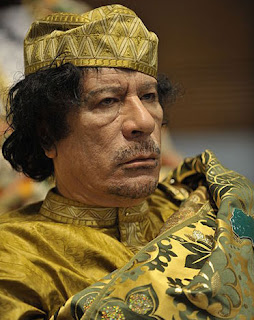There comes a time in every great dictator's life when he puts pen to paper and writes a series of quasi-philosophical, Gonzo short stories that address themes of urban alienation, the pharmacisation of emotional problems, family dilemmas, and the flatness of a globalised world, which then get published as a proper, bound, English-language book, with a foreword by former White House Press Secretary and United States Senator Pierre Salinger.
Well, actually, no, that is not true. That only applies to Muammar al-Qaddafi, the David Bowie of modern tyrants, who wrote Escape to Hell and Other Stories in the early 1990s, one of the better (or less horrifically godawful) periods of his rule over the Great Socialist Libyan Arab People's State of the Masses. Qaddafi apparently was trying, at the time, to reinvent himself as a serious, if deliberately unpalatable to Western post-Enlightenment sensibilities, political 'wise man' along the lines of Sayyid Qutb or Mahmoud Mohamed Taha. Escape to Hell was his Eoineen of the Birds, an intended sally of the political into realms of serious cultural production, and what a quixotic sally it is.
Pierre Salinger, who wrote the foreword for Qaddafi's short-story collection, is of course the famed reporter-turned-Kennedy Administration official-turned-appointed Senator from California-turned-reporter-turned-conspiracy theorist worryingly reminiscent of Maniwa from Paranoia Agent. With his gushing attitude towards the work, Salinger betrays either an excessively loose adherence to his own culture's political mores (such as representative democracy, an independent judiciary, minority rights, or the rule of law), poor literary taste unfortunate given his apparent distant relation to the author of Franny and Zooey and The Catcher in the Rye, or both. I'm going to go with both, for now, and get on to the bulk of the Colonel's work.
Escape to Hell's title story is one of the few with anything like a recognisable plot, although it is really more like a broad-strokes historical fable describing the urbanisation of Arab/North African culture in the modern age, a process of which the author disapproves. Thematically it is similar in this respect to a certain subset of classic Westerns, though I do not doubt that the author and, for instance, John Wayne would fall in hate at first sight. It is by no means badly-written--it is spare and has a certain grim elegance similar to that of the desert that Qaddafi calls home--and its themes, unlike the themes of pretty much everything else in the Qaddafi ouevre, can be reasonably defended as serious literary explorations of alienation and the demysitification of the world.
After this, the only part of the book that can really be classified as a story, Qaddafi abandons plot, characters, dialogue, and the other markers of narrative writing in favour of a more stream-of-conscious, almost Gonzo style, with which he tells the stories of, among other things, his own childhood, a shady pharmacist in Benghazi who moonlights as a drug dealer (it is clear that Qaddafi was under the influence of this gentleman's wares when he wrote about him), Operation El Dorado Canyon (though only in passing), and a family of Touaregs that he claims to know but which may well be yet another surprising use of actual fiction in this ostensible short-story collection.
Escape into Hell is not a good book in the conventional sense, but it is an interesting book and at least not as horribly written and utterly unengrossing as many other tyrants' screeds, such as Qaddafi's own non-fictional (in the same way that Escape into Hell is fictional, which is to say not very) Green Book. The foreword reveals worrying things about Pierre Salinger, the title story reminds one somewhat of a desert Charles Portis albeit one who is phoning it in, and the rest of the book is useful for its glimpse into the mind and self-justifications and rationalisations of the man whose name is so commonly followed by '--must go now' in the news these days.
Also, 'Pierre Salinger, who wrote the foreword for Qaddafi's short-story collection' is the second most surprising-even-to-me phrase I have written to-day, after 'Unleash nerd rage: Target: Neil Gaiman'.
Well, actually, no, that is not true. That only applies to Muammar al-Qaddafi, the David Bowie of modern tyrants, who wrote Escape to Hell and Other Stories in the early 1990s, one of the better (or less horrifically godawful) periods of his rule over the Great Socialist Libyan Arab People's State of the Masses. Qaddafi apparently was trying, at the time, to reinvent himself as a serious, if deliberately unpalatable to Western post-Enlightenment sensibilities, political 'wise man' along the lines of Sayyid Qutb or Mahmoud Mohamed Taha. Escape to Hell was his Eoineen of the Birds, an intended sally of the political into realms of serious cultural production, and what a quixotic sally it is.
Pierre Salinger, who wrote the foreword for Qaddafi's short-story collection, is of course the famed reporter-turned-Kennedy Administration official-turned-appointed Senator from California-turned-reporter-turned-conspiracy theorist worryingly reminiscent of Maniwa from Paranoia Agent. With his gushing attitude towards the work, Salinger betrays either an excessively loose adherence to his own culture's political mores (such as representative democracy, an independent judiciary, minority rights, or the rule of law), poor literary taste unfortunate given his apparent distant relation to the author of Franny and Zooey and The Catcher in the Rye, or both. I'm going to go with both, for now, and get on to the bulk of the Colonel's work.
Escape to Hell's title story is one of the few with anything like a recognisable plot, although it is really more like a broad-strokes historical fable describing the urbanisation of Arab/North African culture in the modern age, a process of which the author disapproves. Thematically it is similar in this respect to a certain subset of classic Westerns, though I do not doubt that the author and, for instance, John Wayne would fall in hate at first sight. It is by no means badly-written--it is spare and has a certain grim elegance similar to that of the desert that Qaddafi calls home--and its themes, unlike the themes of pretty much everything else in the Qaddafi ouevre, can be reasonably defended as serious literary explorations of alienation and the demysitification of the world.
After this, the only part of the book that can really be classified as a story, Qaddafi abandons plot, characters, dialogue, and the other markers of narrative writing in favour of a more stream-of-conscious, almost Gonzo style, with which he tells the stories of, among other things, his own childhood, a shady pharmacist in Benghazi who moonlights as a drug dealer (it is clear that Qaddafi was under the influence of this gentleman's wares when he wrote about him), Operation El Dorado Canyon (though only in passing), and a family of Touaregs that he claims to know but which may well be yet another surprising use of actual fiction in this ostensible short-story collection.
Escape into Hell is not a good book in the conventional sense, but it is an interesting book and at least not as horribly written and utterly unengrossing as many other tyrants' screeds, such as Qaddafi's own non-fictional (in the same way that Escape into Hell is fictional, which is to say not very) Green Book. The foreword reveals worrying things about Pierre Salinger, the title story reminds one somewhat of a desert Charles Portis albeit one who is phoning it in, and the rest of the book is useful for its glimpse into the mind and self-justifications and rationalisations of the man whose name is so commonly followed by '--must go now' in the news these days.
Also, 'Pierre Salinger, who wrote the foreword for Qaddafi's short-story collection' is the second most surprising-even-to-me phrase I have written to-day, after 'Unleash nerd rage: Target: Neil Gaiman'.


Who's Neil Gaiman?
ReplyDeletePerson writing for Doctor Who this season. Very popular in pretty much every other situation than the one involved.
ReplyDelete